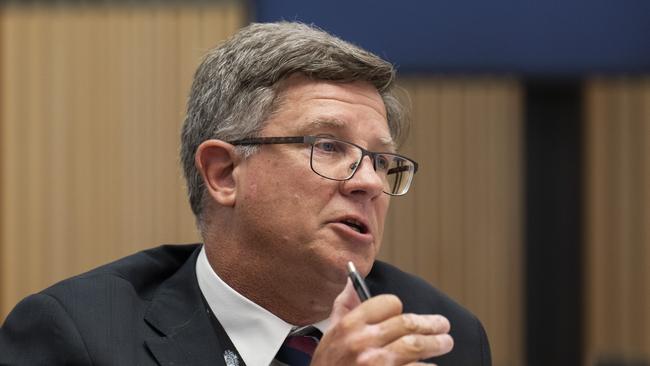Chris Bowen’s department talks up its influence over foreign policy
Chris Bowen’s Climate Change department has talked-up its ‘incredible influence’ over the conduct of foreign policy amid the growing importance of Australia’s economic security.

The head of Chris Bowen’s Climate Change and Energy Department has declared he runs a “department of national security” with “incredible influence in the conduct of foreign policy in this country”.
Speaking on a panel on Wednesday night in Sydney organised by the US Studies Centre, David Fredericks said his “charge to my department is, whenever we are thinking about domestic policy, we need to also think about how it might be able to reinforce Australia’s national interest and national security objectives.”
In a broader discussion about the collision of economic security with national security, Mr Fredericks declared his department had “incredible influence in the conduct of foreign policy in this country, and in ensuring national security of this country”.
In July 2022, Anthony Albanese added Mr Bowen to the National Security Committee of cabinet where he joined other key frontbenchers including Defence Minister Richard Marles, Foreign Minister Penny Wong, Jim Chalmers, Home Affairs Minister Clare O’Neil and the Attorney-General, Mark Dreyfus.
The Director-General of National Intelligence, Andrew Shearer, also warned on Wednesday night that Australia faced a “much more contested, fragmented, challenging security environment”.
In rare public statements, Mr Shearer said this more challenging environment required intelligence agencies to work more closely with other departments to maintain Australia’s “high fence, small yard” approach to protecting key economic assets of strategic interest – an approach sketched out by Treasury secretary Steven Kennedy.
Speaking on the panel alongside Mr Fredericks and Industry Department secretary Meghan Quinn, Mr Shearer said ONI increasingly provided advice on “where the fence should go and what the contours look like”.
Part of its job was to alert government to whether anyone was “planning to get over the fence or under the fence or through the fence” and to work more closely with the private sector.
“One of the most surprising revelations for me about my job until I started doing it was exactly how much time I spend with private sector leaders in Australia,” Mr Shearer said. “I can’t secure our most vital supply chains. None of us can on their own … We can only do that in partnership.”
Mr Fredericks cited the example of global negotiations for the annual Conference of the Parties meetings attended by Australia and at which international climate objectives and obligations were set as an example of how his department influenced foreign policy.
“We’re seeking climate objectives. And we understand that there are also geopolitics at play,” he said.
The development in Australia of a green hydrogen industry was not done “just for ourselves, but for our allies” and other like-minded countries to deliver both domestic and international benefits.
Mr Fredericks revealed that his department often had “exhaustive” discussions with ONI and DFAT to “seek their guidance” in terms of how to best uphold Australia’s interests during any bilateral engagements.




To join the conversation, please log in. Don't have an account? Register
Join the conversation, you are commenting as Logout